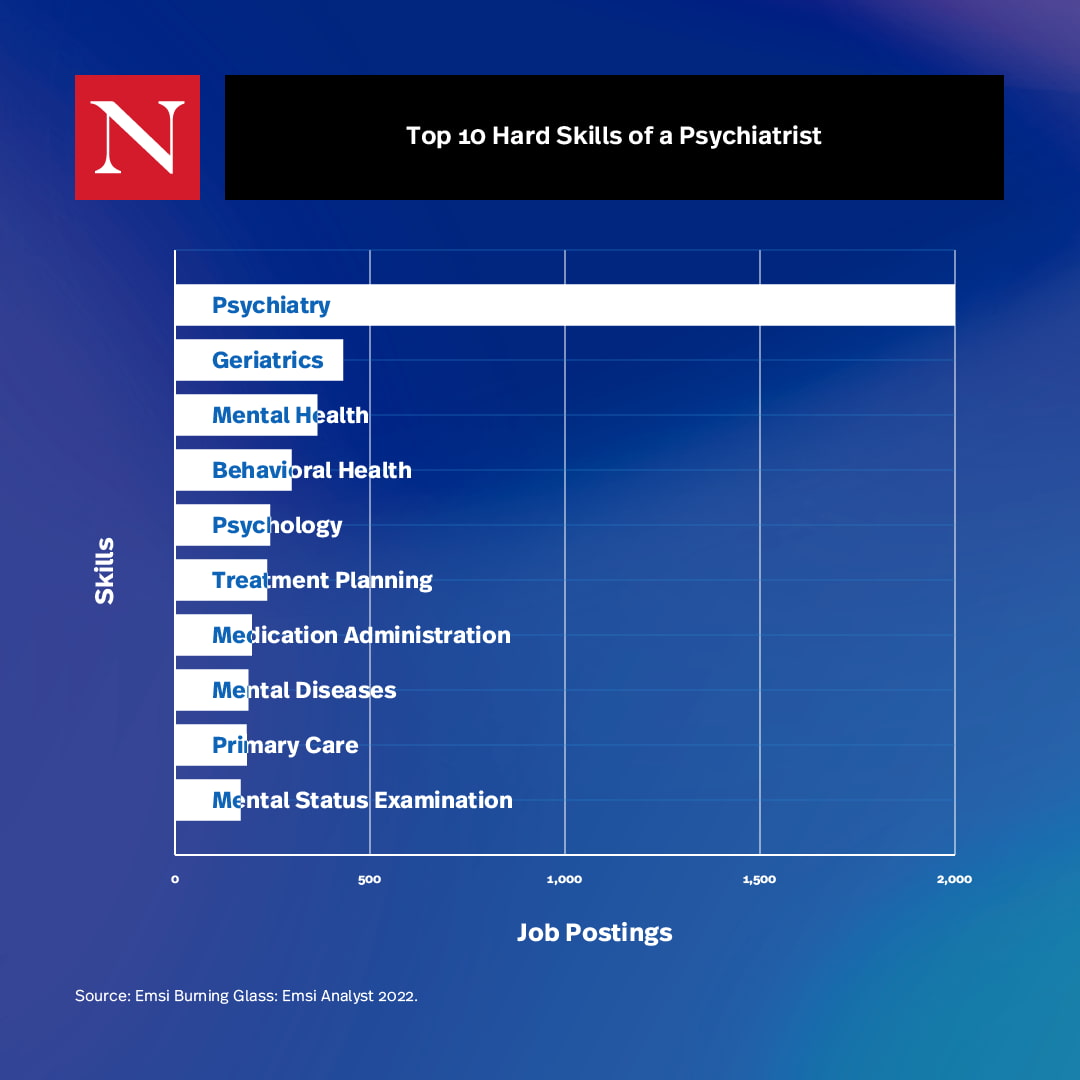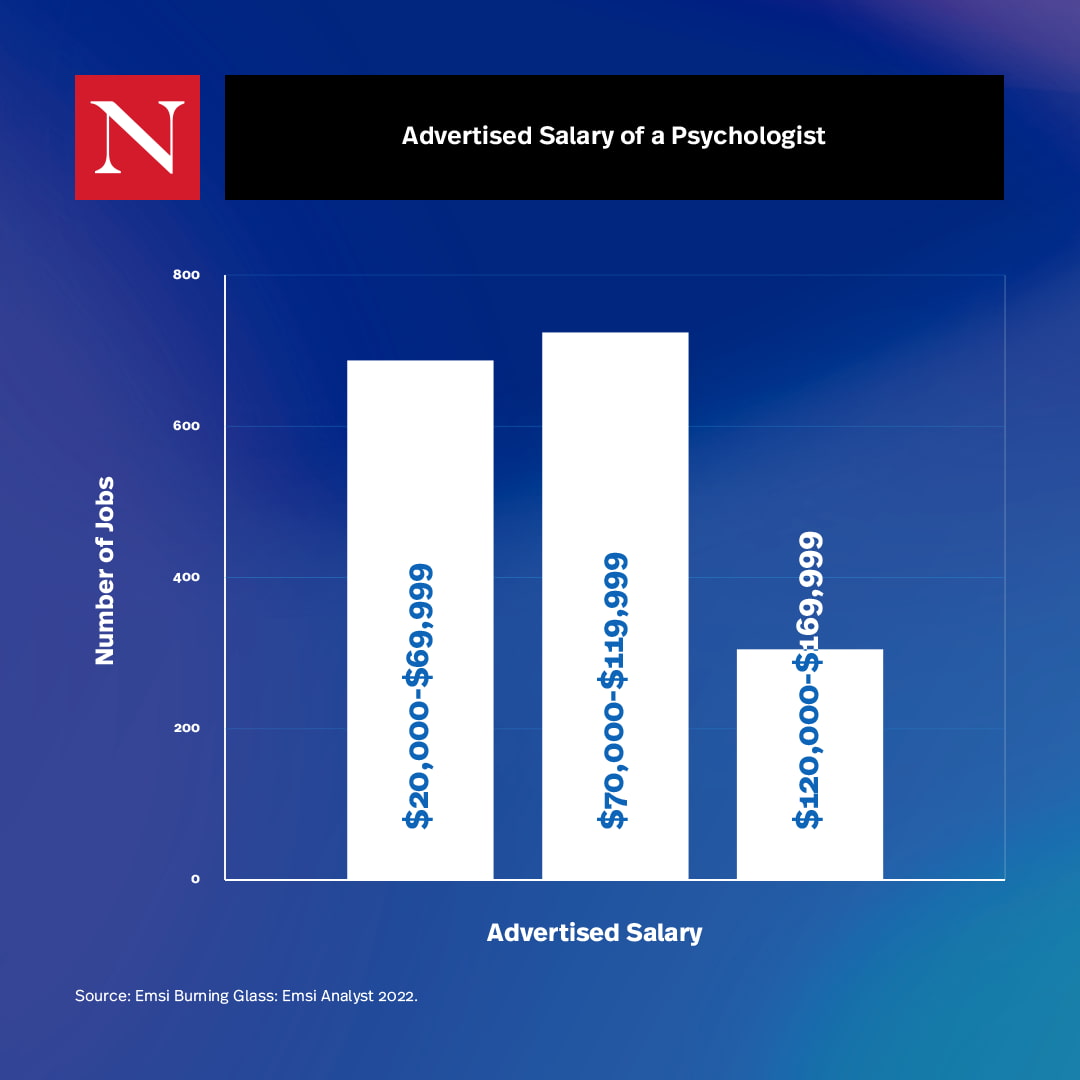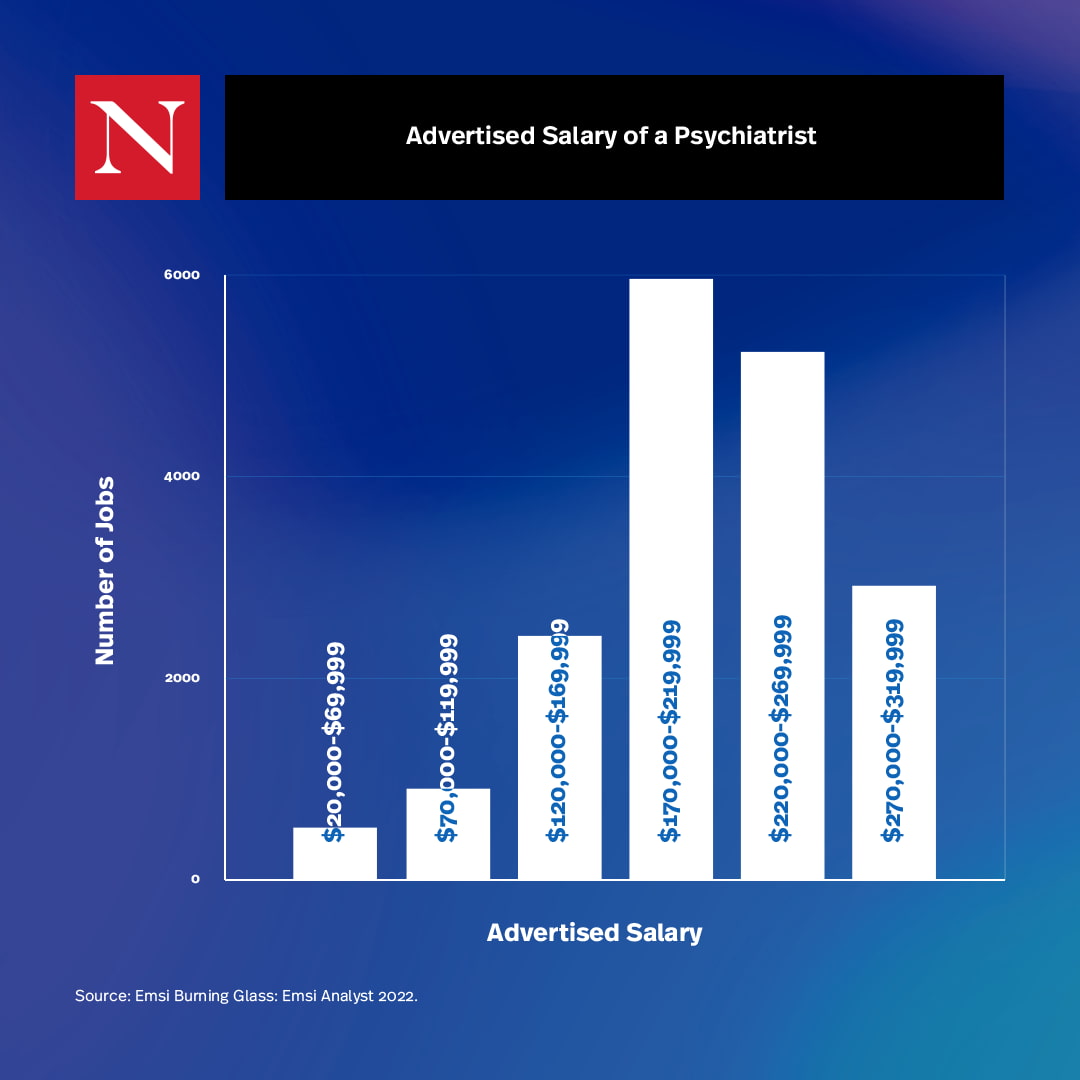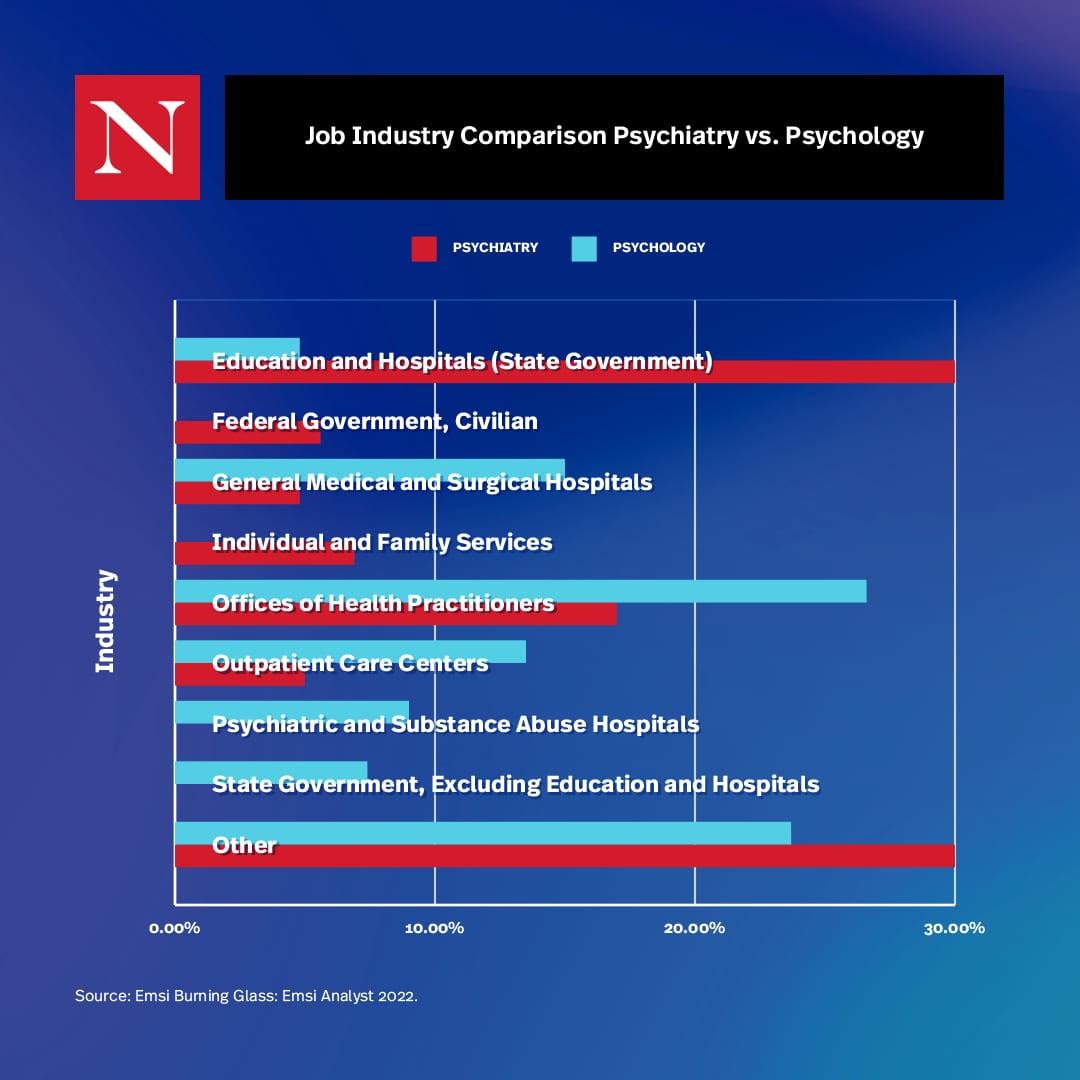What Is The Difference Between A Psychologist And A Psychiatrist
Julia Simkus
Editor at Simply Psychology
BA (Hons) Psychology, Princeton University
Julia Simkus is a graduate of Princeton University with a Bachelor of Arts in Psychology. She is currently studying for a Master's Degree in Counseling for Mental Health and Wellness in September 2023. Julia's research has been published in peer reviewed journals.
Learn about our Editorial Process
Saul McLeod, PhD
Editor-in-Chief for Simply Psychology
BSc (Hons) Psychology, MRes, PhD, University of Manchester
Saul McLeod, PhD., is a qualified psychology teacher with over 18 years of experience in further and higher education. He has been published in peer-reviewed journals, including the Journal of Clinical Psychology.
Olivia Guy-Evans, MSc
Associate Editor for Simply Psychology
BSc (Hons) Psychology, MSc Psychology of Education
Olivia Guy-Evans is a writer and associate editor for Simply Psychology. She has previously worked in healthcare and educational sectors.
On This Page:
Many people tend to assume that ‘psychiatry’ and ‘clinical psychology’ are interchangeable terms, but these two specialties have numerous key differences.
The main difference between a psychologist and a psychiatrist lies in their training and treatment approaches. Psychologists typically hold a PhD or PsyD and focus on psychotherapy, psychological testing, and research. Psychiatrists are medical doctors (MDs) who specialize in mental health. They can prescribe medication, conduct physical examinations, and use medical interventions alongside psychotherapy to treat mental health disorders.
Psychiatrists and psychologists often work together, each embodying a different role. Often, a psychiatrist will make an initial diagnosis, prescribe any necessary medications, and then refer you to a psychologist for ongoing psychotherapy .
The two professionals will work in collaboration with each other in the total assessment and diagnostic process of an individual, couple, or family. The psychiatrist will typically manage the medications while the psychologist will provide therapy services.

Education and Training
Psychiatrists must graduate from medical school and become licensed medical doctors before completing their training in the diagnosis and treatment of mental illness.
While they are educated in behavioral science and mental processes, they receive most of their education and experience in medical studies, and their coursework emphasizes medicine, human biology, and anatomy. Becoming a psychiatrist usually requires at least 11 years of education and training.
Clinical psychologists, on the other hand, need either a master’s degree in a psychology-related field or a doctorate degree in clinical psychology – either a Ph.D. (Doctor of Philosophy in psychology) or a PsyD (Doctor of Psychology).
If a psychologist earns a Ph.D. or PsyD, he/she would be considered a doctor. They receive professional training specifically focused on treatment methods to help individuals cope with a variety of cognitive, emotional, and behavioral problems.
Their coursework emphasizes human development and behavior. Becoming a clinical psychologist usually requires around at least six years of education and training.
While both psychiatrists and clinical psychologists might be considered doctors, a psychiatrist is a medical doctor, whereas a clinical psychologist has earned a doctorate in the field of clinical psychology
Specialties
Psychiatrists tend to focus on the brain and medicine to treat psychiatric and psychological disorders. They usually treat people with more serious, complex, and abnormal conditions such as schizophrenia, bipolar disorder, and severe depression.
They focus on medication management and identifying and medically treating disorders. They can understand the intricacies of the brain and how diseases, such as metabolic disorders, poor nutrition, drug or alcohol abuse, and severe head injuries, can affect our minds and behavior.
Clinical psychologists are more concerned with cognition, mental health conditions, behavioral problems, depression, and anxiety.
They tend to serve the role of a counselor or therapist, using psychotherapy to help patients cope with mental illness, work through personal issues, and develop healthy coping mechanisms for emotional problems.
They can provide services for specific populations such as children and adolescents, veterans, LGBTQ persons, people with learning disabilities, families, couples, or elderly people.
They also will typically have a specialty or a niche in an area, such as substance abuse, depression, anxiety, personality disorders, posttraumatic stress disorder, or eating disorders.
They focus on treating emotional and mental suffering and use psychotherapy to work through these problems.
Treatments provided
Both psychologists and psychiatrists are trained to provide therapy and treat behavioral health problems in the Diagnostic Statistical Manual of Mental Disorders.
Psychiatrists can diagnose illnesses, prescribe medications, manage psychological treatment, and provide therapy. Psychiatrists tend to focus their sessions with patients on managing dosages of medication and monitoring the patient’s progress and symptoms while on medication. Patients usually do not engage in talk therapy with their psychiatrist, although they certainly can.
Psychologists, on the other hand, focus specifically on psychotherapy and take a more holistic approach to treat patients.
They cannot prescribe medication and usually work with patients to create treatment plans to work through difficult emotional and behavioral issues.
Psychologists utilize psychotherapy which is a talk-based therapy, but there are various approaches and techniques within this field.
Examples include psychodynamic therapy, cognitive behavioral therapy , psychoanalysis , dialectical behavioral therapy , emotionally focused therapy, and existential therapy.
Where they practice
Psychiatrists can work in hospitals, private practices, psychiatric facilities, and government facilities. They typically work in collaboration with a patient’s other medical providers and alongside a patient’s psychologist.
Clinical psychologists tend to work in outpatient facilities or offices as individual practitioners in private practice or as part of a group practice. They can also work as organizational psychologists in hospitals, health clinics, schools and universities, rehabilitation centers, or large corporations.
While psychiatrists and clinical psychologists treat mental and behavioral health problems, there are fundamental differences in education, authority to medicate, treatment approach, and work environment.
However, despite these differences, psychologists and psychiatrists are both essential in researching about and developing treatments for improving the mental and emotional well-being of people.
The Royal Australian and New Zealand College of Psychiatrists. (n.d.). Psychiatrists and psychologists: What’s the difference? Your Health in Mind. Retrieved from https://www.yourhealthinmind.org/psychiatry-explained/psychiatrists-and-psychologists
Pipich, M. (2020, April 28). Clinical psychology vs. psychiatry: Key differences & what each does. Choosing Therapy. Retrieved from https://www.choosingtherapy.com/psychology-vs-psychiatry/
Psychology.org Staff. (2022, January 31). Difference between psychologist vs Psychiatrist. Psychology.org. Retrieved from https://www.psychology.org/resources/how-to-choose-between-psychologist-or-psychiatrist-career/
Are psychologists doctors?
Yes and no. Psychologists have doctoral degrees in psychology (Ph.D. or Psy.D.), making them doctors in their field.
However, they are not medical doctors (MDs) and generally cannot prescribe medication, unlike psychiatrists who are medical doctors specializing in mental health and can prescribe medication.
Can a psychologist diagnose mental illness?
Yes, psychologists are trained to diagnose and treat various mental health disorders. They use psychological tests, interviews, and direct behavior observation to provide diagnoses.
However, while they can provide therapy, they generally cannot prescribe medication, distinguishing them from psychiatrists.
Do psychiatrists do therapy?
Yes, psychiatrists can provide psychotherapy , a form of therapeutic treatment involving conversations and interventions aimed at improving a patient’s mental health. However, their role often focuses more on diagnosis and medication management due to their medical training.
What can a psychiatrist do that a psychologist cannot?
A psychiatrist, being a medical doctor, can prescribe medication and provide a range of medical interventions for mental health disorders.
Unlike most psychologists, they can also perform physical examinations and order diagnostic tests to rule out physical causes of mental health symptoms.

Psychiatrist vs. Psychologist: Which One is Right For You?

Industry Advice Healthcare
The terms psychiatrist and psychologist are often conflated due to their similar work in supporting the mental well-being of others—and partially because the names are very similar. However, while these careers have similarities, they’re very different. In addition to their contrasting responsibilities, each profession requires different educational and licensure requirements.
As someone considering a career in the mental health field—but not sure whether to pursue psychology or psychiatry—you first need to understand each career path and how they differ from one another. Here’s an overview of the psychology and psychiatry career paths, and how to navigate these different fields to best meet your professional goals.
What Is a Psychologist?
On the surface, a licensed psychologist is a mental health professional tasked with supporting the mental well-being of their clients. The nuances of the career, however, cover a wide range of responsibilities depending on the avenue of psychology you choose to pursue.
A psychologist’s toolkit consists of therapeutic support, such as individual or group therapy, family therapy, as well as assessments and consultations. The specific therapeutic methods used depend on factors like the client’s individual struggles, the psychologist’s therapeutic goals, or the setting in which the psychologist works.
For example, in some situations, the goal might be to address specific challenges a client is facing such as depression, anxiety, relationship difficulties, behavior problems, or a learning disability. The type of service required will depend on each situation.
While psychology encompasses a wide range of career paths in both research and practice, some of the most common careers are in applied psychology. Licensed psychologists earn a degree in one of three areas: school psychology, counseling psychology, or clinical psychology.
- School psychology : School psychologists work primarily with children in school settings. They support students’ academic, social, emotional, and behavioral well-being while assisting teachers in behavior management techniques for the classroom. They provide counseling to children individually and in groups, consult with teachers, parents, and administrators, and conduct assessments to determine if children need special education. School psychologists often take a preventative approach to mental health, such as leading social skills groups or teaching social and emotional learning (SEL) lessons to classrooms of students. School psychologists usually follow the school calendar, giving them more flexibility during school vacations and the summer.
- Counseling psychology : Counseling psychologists run individual, family, or group counseling sessions and work mostly with adolescents and adults. Their goal is to help clients navigate the challenges of day-to-day life and overcome everyday difficulties they’re facing. Many work in outpatient counseling centers, and some operate their own private practice, giving them flexibility over their schedule and clientele.
- Clinical psychology : Clinical psychologists have many overlapping responsibilities of counseling and school psychologists, but generally focus on clients who are struggling with more severe mental disorders. They often work in inpatient and outpatient hospital settings, counseling centers, and private practice.
Regardless of the specialty area, the overall objective is to make a positive difference in clients’ lives, whether through mental health services or research.
What Is a Psychiatrist?
A psychiatrist is a medical doctor who focuses on the biological factors of mental health. They address mental health issues from a medical perspective, assessing how both mental and physical concerns might contribute to psychological challenges and prescribing medication for treatment.
Psychiatrists’ medical training prepares them to perform multiple lab and psychological tests to diagnose physical and mental health conditions patients may be facing and prescribe medication. Psychiatrists work with people across the lifespan, meaning they work with children, adolescents, adults, and older adults.
A psychiatrist typically uses medications to treat their patients. However, psychiatrists occasionally provide counseling in certain instances. Psychiatrists work in various settings, including hospitals and outpatient settings, including private practice.
Psychiatrist vs. Psychologist
Psychiatrists and psychologists have similar objectives but take different approaches to treatment. Here are five key differences between them.
1. Job Description
Both psychologists and psychiatrists are committed to providing support for people who want to improve their mental health and well-being, but psychologists focus on the psychological and environmental factors that impact well-being. They work with clients to teach coping skills and use other interventions to help them manage stressors, behavioral problems, and other challenges.
Psychiatrists, on the other hand, are trained as medical doctors and take a biological approach to the treatment of mental health disorders. While psychologists can treat clients using therapeutic approaches such as behavioral modification, talk therapy, and mindfulness practice, psychiatrists can take treatment one step further by determining whether medication would help and, if so, prescribing it.
2. Educational Requirements
While scope of practice is a key difference in psychiatry vs. psychology, each career path also requires different levels of education. Both careers require an undergraduate and graduate degree, but each track has distinct differences worth noting.
Psychologists typically need to complete a doctoral degree, which is either a PhD or PsyD. However, school psychologists can practice with either a doctoral degree, an Educational Specialist (EdS), or a Certificate of Advanced Graduate Study (CAGS) degree. To earn your PhD or PsyD takes approximately 5–7 years to complete and includes a masters degree along the way. If you choose not to earn a doctoral degree, school psychologists can earn their license to practice with an EdS or CAGS, which takes 3 years to complete in addition to a master’s degree. Since psychiatrists are licensed physicians, their line of work requires more education. They must attend medical school to earn a doctor of medicine degree (MD), and complete a four-year residency.
3. Skills Required
In addition to the necessary training and qualifications, psychiatrists and psychologists need knowledge and skills in a wide range of areas to excel in their respective careers. The primary knowledge and skills found in psychologist job postings are:
- Student services
- Special education
- Mental health
- Individualized education programs (IEP)
- Behavioral health
- Treatment planning
- Clinical psychology
- Psychotherapy

Psychiatrist job postings contain many similar areas of knowledge and skills, but tend to reflect the medical side of mental health treatment. Employers hiring psychiatrists typically look for knowledge and skills in the following areas:
- Medication administration
- Mental diseases
- Primary care
- Mental status examination

Both psychiatrists and psychologists have the potential to earn high salaries. In most cases the exact amount psychologists can earn largely depends on the amount of education they complete and their specializations. However, a psychologist typically makes between $70,000–$170,000 per year.

On average psychiatrists earn over $200,000 annually, most making between $170,000–$270,000 per year. It’s important to keep in mind that this salary results from extensive medical training, as psychiatrists typically complete 12 years of training in total.

5. Industries
Psychologists work in a variety of settings, depending on their job titles, but most work primarily in offices of health practitioners, run private practices, or work in academia or school settings. School psychologists, for example, work in a public school setting.
Psychiatrists primarily work in a hospital setting, but may also operate private practices, or work in other settings like nursing homes, offices of health practitioners, military settings, hospice programs, and more.

How They Work Together
Psychologists and psychiatrists often work together. Both conduct assessments to diagnose mental health disorders. In terms of treatment, many times people benefit from both counseling and medication. In fact, there are times psychologists will refer clients to psychiatrists if they believe medication may be helpful. Other times, psychiatrists will refer patients to psychologists for psychotherapy, which psychiatrists may not have the time or training to conduct. Or psychologists and psychiatrists will directly consult with each other, particularly if they work on the same treatment team in a hospital setting.
Choosing a Career Path
If you’re trying to decide between a career as a psychologist or psychiatrist, it’s important to thoroughly understand the differences between the two professions. While many of the treatment methods used by each position are similar, there are many distinctions that you should evaluate when selecting a career path. Here are three tips to help you decide which field is right for you.
1. Identify Your Interests
Start by asking important questions about what draws you to each line of work. What interests you about each profession? Are you more interested in the psychological reasons behind decision-making, or the impact that medical conditions have on the brain? Would you prefer to use a psychotherapeutic approach, or would you like the ability to prescribe medication?
Some of these questions may seem too specific, but there are plenty of other ways to identify your interests and how they can be applied to a future career. For example, individuals interested in science like biology and chemistry, who see themselves as a future physician, may lean toward a career in psychiatry. Those who want to provide support to individuals with mental health challenges through talk therapy and interpersonal collaboration, may want to pursue a career in psychology. Finding what interests you about each profession and using that information to guide your ultimate decision is a helpful way to choose the right path.
2. Explore Your Career Goals
Whichever career path you choose, it should align with your personal and professional goals. These can include how much money you’d like to make, or how quickly you’d like to move into the profession. Do you want to work with a specific age group or in a certain setting? Create a list of these career goals and determine which path provides the opportunities to accomplish them.
3. Shadow Professionals in the Field
A great way to immerse yourself in any given field, without the commitment of education and training, is shadowing professionals in your area. Reach out to your local psychologists and psychiatrists and see if they’d be willing to let you shadow them for a week or two. Have conversations with people who are already working in the field to better understand what their job is like and what interests them about it. Alternatively, you can leverage platforms like LinkedIn to connect with psychiatrists and psychologists to ask questions and see what advice they can share with you. You’d be surprised how many people are eager to encourage, and even help, individuals who are just beginning their career journey.
Considering a Career in Psychology?
The amount of education required for many of these career paths may be overwhelming. The good news is that not every psychology career path requires completion of a doctoral or medical degree. If you’re looking for a career providing mental health and learning support services to children and adolescents in school settings that doesn’t require a doctoral degree, you may want to consider school psychology. Accredited school psychology programs like Northeastern University’s Master’s/CAGS in School Psychology provide you with the qualifications to obtain licensure and move directly into the field immediately following graduation, allowing you the opportunity to help people as soon as possible.


Subscribe below to receive future content from the Graduate Programs Blog.
About michael boyles, related articles, 4 pressing global health problems we face today, global health careers: how can i make a difference.

Compliance Specialists: Who They Are and What They Earn
Did you know.
Advanced degree holders earn a salary an average 25% higher than bachelor's degree holders. (Economic Policy Institute, 2021)
Northeastern University Graduate Programs
Explore our 200+ industry-aligned graduate degree and certificate programs.
Most Popular:
Tips for taking online classes: 8 strategies for success, public health careers: what can you do with an mph, 7 international business careers that are in high demand, edd vs. phd in education: what’s the difference, 7 must-have skills for data analysts, in-demand biotechnology careers shaping our future, the benefits of online learning: 8 advantages of online degrees, how to write a statement of purpose for graduate school, the best of our graduate blog—right to your inbox.
Stay up to date on our latest posts and university events. Plus receive relevant career tips and grad school advice.
By providing us with your email, you agree to the terms of our Privacy Policy and Terms of Service.
Keep Reading:

Top Higher Education Conferences To Attend in 2024

Grad School or Work? How To Balance Both

Is a Master’s in Computer Science Worth the Investment?

Should I Go to Grad School: 4 Questions To Consider
- Bipolar Disorder
- Therapy Center
- When To See a Therapist
- Types of Therapy
- Best Online Therapy
- Best Couples Therapy
- Managing Stress
- Sleep and Dreaming
- Understanding Emotions
- Self-Improvement
- Healthy Relationships
- Student Resources
- Personality Types
- Guided Meditations
- Verywell Mind Insights
- 2024 Verywell Mind 25
- Mental Health in the Classroom
- Editorial Process
- Meet Our Review Board
- Crisis Support
Psychologist vs. Psychiatrist: What Are the Differences?
Key Differences in Training, Practice, and Treatments
Kendra Cherry, MS, is a psychosocial rehabilitation specialist, psychology educator, and author of the "Everything Psychology Book."
:max_bytes(150000):strip_icc():format(webp)/IMG_9791-89504ab694d54b66bbd72cb84ffb860e.jpg)
Amy Morin, LCSW, is a psychotherapist and international bestselling author. Her books, including "13 Things Mentally Strong People Don't Do," have been translated into more than 40 languages. Her TEDx talk, "The Secret of Becoming Mentally Strong," is one of the most viewed talks of all time.
:max_bytes(150000):strip_icc():format(webp)/VW-MIND-Amy-2b338105f1ee493f94d7e333e410fa76.jpg)
- Basic Differences
- Education and Training
Prescriptive Authority: Psychologists vs. Psychiatrists
- Patient Treatment
Should You See a Psychologist vs. a Psychiatrist?
- Career Path
Job Outlook for Psychologists vs. Psychiatrists
The terms " psychologist " and " psychiatrist " are often used interchangeably to describe anyone who provides therapy services, but the two professions and the services they provide differ in terms of content and scope. In order to decide which professional might be best suited for providing your treatment, it is important to be aware of the differences between these professions.
Psychologist vs. Psychiatrist: Key Differences
Psychiatrists are medical doctors who are able to prescribe medications, which they do in conjunction with providing psychotherapy, though medical and pharmacological interventions are often their focus.
Though many psychologists hold doctorate degrees, they are not medical doctors, and most cannot prescribe medications. Rather, they solely provide psychotherapy, which may involve cognitive and behavioral interventions.
Have a doctorate degree in psychology
Provide a variety of talk therapies
Offer psychological testing and evaluation
Cannot prescribe medications in most cases
Have a medical degree
Offers psychological assessment and may provide some talk therapy
Addresses conditions from a bio/neurochemical perspective
Can prescribe medications
Education, Training, and Credentials
While psychologists and psychiatrists may have some overlapping responsibilities, such as conducting psychotherapy and performing research, the background they need to perform them differs.
Requirements for Psychologists
Psychologists receive graduate training in psychology and pursue either a PhD (Doctor of Philosophy) or PsyD (Doctor of Psychology) in clinical or counseling psychology .
Doctorate programs typically take five to seven years to complete and most states require an additional one- or two-year-long internship in order to gain licensure. Other states require another year or two of supervised practice before granting full licensure.
During their education, those pursuing either a PhD or PsyD doctoral degree take courses in:
- Personality development
- Psychological research methods
- Treatment approaches
- Psychological theories
- Cognitive therapies
- Behavioral therapies
"Psychologist" Is a Protected Title
The title of "psychologist" can only be used by an individual who has completed the required education, training, and state licensure requirements. Informal titles, such as "counselor" or "therapist," are often used as well, but other mental health care professionals, such as licensed social workers , can also claim these titles.
The PhD degree option tends to be more research-oriented. Those who earn a PhD in clinical or counseling psychology receive extensive training in research methods and complete a dissertation.
The PsyD degree option, on the other hand, tends to be more practice-oriented. Students who pursue this degree option spend more time learning about and practicing clinical approaches and treatment methods.
Like psychiatrists, psychologists utilize the Diagnostic and Statistical Manual of Mental Disorders (DSM) to diagnose people who are experiencing symptoms of psychological illness. They often use psychological tests such as personality tests, clinical interviews, behavioral assessments, and IQ tests in order to get a better idea of how a client is functioning.
Requirements for Psychiatrists
Psychiatrists are physicians who have specific training in the assessment, diagnosis, treatment, and prevention of mental illnesses. In order to become a psychiatrist, students first earn an undergraduate degree before they attend medical school and receive an MD.
After finishing their medical training, they also complete an additional four years of residency training in mental health. This residency often involves working in the psychiatric unit of a hospital. They also work with a wide variety of patients, ranging from children to adults, who may have behavioral problems, emotional difficulties, or some sort of psychiatric disorder .
During this medical residency, those specializing in psychiatry receive training and practice in how to diagnose and treat different psychiatric conditions, such as:
- Post-traumatic stress disorder (PTSD)
- Attention-deficit hyperactivity disorder (ADHD)
- Schizophrenia
- Bipolar disorder
Psychiatrists receive training in different psychotherapy treatment modalities, including cognitive behavioral therapy (CBT) . CBT is a popular treatment approach that has been shown to have a high level of effectiveness in the treatment of a wide variety of psychiatric conditions including anxiety disorders, somatoform disorders, stress, and anger issues.
Some research suggests that combining CBT and medications may be more effective than medication alone in the treatment of some conditions.
Psychiatrists also receive additional training in a specific area of interest, such as geriatric psychiatry, child and adolescent psychiatry, addictions, and other areas. Some may then choose to specialize further by completing a fellowship in an area like neuropsychiatry, geriatrics, adolescent psychiatry, or psychopharmacology.
A second important distinction between the two careers is that psychiatrists can prescribe medications , while, in most states, psychologists cannot. However, there has been a recent push to grant prescribing powers to psychologists.
Some states—such as New Mexico and Louisiana—now grant prescribing privileges to medical psychologists holding a post-doctoral master's degree or equivalent in clinical psychopharmacology.
Kevin McGuinness, chairman of the Commissioned Corps Mental Health Functional Advisory Group, explained, "For those interested in a career in psychology as a prescriber, it is important to know that certain federal employees and uniformed commissioned officers (Army, Air Force, Public Health Service, Navy, etc.) that are licensed in one state as a medical psychologist may prescribe in any other state to which they are assigned by the federal government."
Do They Offer Different Treatments?
While the two professions are distinct, psychologists and psychiatrists both play important roles in mental health treatment. Very often, they work in collaboration with one another to provide the best possible treatment for an individual.
For example, patients may begin by seeing their primary care physician about the psychological symptoms that they are experiencing. Their doctor may then refer them to a psychologist for further evaluation. That psychologist may observe, assess, and diagnose the patient before referring them to a psychiatrist who can prescribe and monitor medications.
The psychologist and psychiatrist may work together, with the psychologist offering behavioral interventions and the psychiatrist providing or adjusting medication in order to best address the patient's symptoms. The type of approach needed often depends on the severity of the symptoms and the needs and wishes of the patient.
Research suggests that people have different preferences about whether they want psychotherapy alone or in combination with medication. These preferences can affect what professionals they see. It can be helpful to consider how each professional might approach the treatment of specific conditions before deciding which treatment options might be right for you.
For conditions such as ADHD, anxiety, depression, eating disorders, and trauma, a psychiatrist may focus on using prescription medications to manage symptoms, whereas a psychologist would concentrate on psychotherapy to help address negative beliefs and encourage behavior changes. It is important to note that a number of factors go into determining which professional might be best equipped to handle treatment, including how comfortable you feel with them.
The expense can also be a factor; some studies have found that combining treatment approaches may also be more cost-effective for patients.
So is it better to see a psychologist or a psychiatrist? Both professionals can provide mental health assessment, diagnosis, and treatment, so choosing between the two professionals often depends on what you hope to get out of treatment.
- If you want to use medication to relieve symptoms of a mental health problem, consider seeing a psychiatrist.
- If you want to try one-on-on psychotherapy, consider seeing a psychologist.
- Seeking a psychologist may be helpful if you are interested in addressing relationship issues with your partner or a family member.
- If you are experiencing symptoms of a serious mental illness, consider seeing a psychiatrist.
Finding a mental health professional that is a good fit is not always a straightforward task. You might start by asking your doctor to refer you to a psychologist or psychiatrist or ask family and friends who they would recommend. If you decide you want to see a psychiatrist, you will generally need to get a referral from your primary care provider.
Psychologist vs. Psychiatrist Careers
If you are considering a career as a therapist, you will need to determine which career path is best for you. Options you might consider include:
- Psychologist : This can be a great choice if you are interested in conducting psychotherapy, administering psychological tests, and conducting research.
- Psychiatrist : This can be a great choice if you have an interest in medicine and want to be able to prescribe medications to your patients.
- Social worker or counselor : A career in another human services field such as social work or counseling can be a great choice if you want to help people but aren't interested in spending five to eight years in graduate school. These professionals are also qualified to provide mental health services depending on training and experience. Both social work and counseling typically require two or three years of graduate study.
- Psychiatric nursing : Psychiatric nursing is another great career option for students interested in medicine. Advanced psychiatric nurses hold a master's degree or higher in psychiatric-mental health nursing and are able to assess patients, diagnose disorders, provide psychotherapy, and prescribe medications.
Life as a Psychologist or Psychiatrist
Work/life balance and work settings are other factors that students should consider when choosing between a career as a psychologist or psychiatrist. Both medical school and graduate school are rigorous and require a significant investment of time, resources, and energy.
A medical residency can be grueling, and students should feel comfortable working in medical settings if they opt to enter the field of psychiatry. After graduating, psychiatrists who choose to work in hospital settings may be required to work long hours or be on-call.
Psychiatrists may work in hospitals, but they may also opt to work in community mental health centers, academic settings, or private practice. Those who choose to work in private practice may find that they have more control over their schedules and hours.
Psychologists also face similar demands. Some psychologists may choose to work in hospital settings, while others can be found in mental health clinics, government agencies, academic settings, and private practice.
Professionals in this field may find that they need to work evening and weekend hours in order to accommodate clients who work during typical business hours. Like psychiatrists, psychologists working in the mental health field may also need to be on-call at times or be able to respond to emergency situations.
According to the " Occupational Outlook Handbook " published by the U.S. Bureau of Labor and Statistics, the job outlook for psychologists and psychiatrists is expected to grow over the next decade.
The demand for psychiatrists is predicted to rise at a rate of 12% between the years 2019 and 2029, amounting to an increase of around 3,300 jobs. The demand for psychologists is expected to grow at a lower rate of 3% between the years 2019 and 2029, amounting to an increase of about 5,700 more jobs.
The Bureau of Labor Statistics reports that the median salary for psychologists as of May 2020 was $82,180 per year. The median annual salary for psychiatrists in May 2020 was considerably higher at $217,100.
A Word From Verywell
Psychologists and psychiatrists represent distinctive professional designations, but both play a critical role in the field of mental health. Key differences between psychologists and psychiatrists come down to educational background and prescribing powers, but both share the important goal of helping patients feel better.
Neither one is "better" than the other, but a patient's needs and specific symptoms may play a role in which type of professional is best equipped to assist with treatment.
Hofmann SG, Asnaani A, Vonk IJ, Sawyer AT, Fang A. The efficacy of cognitive behavioral therapy: A review of meta-analyses . Cognit Ther Res . 2012;36(5):427-440. doi:10.1007/s10608-012-9476-1
Rutkow L, Vernick JS, Wissow LS, Kaufmann CN, Hodge JG. Prescribing authority during emergencies. Challenges for mental health care providers . J Leg Med . 2011;32(3):249-260. doi:10.1080/01947648.2011.600154
Patel SR, Simpson HB. Patient preferences for obsessive-compulsive disorder treatment . J Clin Psychiatry . 2010;71(11):1434-1439. doi:10.4088/JCP.09m05537blu
van Apeldoorn FJ, Stant AD, van Hout WJ, Mersch PP, den Boer JA. Cost-effectiveness of CBT, SSRI, and CBT+SSRI in the treatment for panic disorder . Acta Psychiatr Scand . 2014;129(4):286-95. doi:10.1111/acps.12169
Birch K, Ling A, Phoenix B. Psychiatric nurse practitioners as leaders in behavioral health integration . J Nurse Pract . 2021;17(1):112-115. doi:10.1016/j.nurpra.2020.09.001
U.S. Bureau of Labor Statistics. Physicians and surgeons . Occupational Outlook Handbook .
U.S. Bureau of Labor Statistics. Psychologists . Occupational Outlook Handbook .
By Kendra Cherry, MSEd Kendra Cherry, MS, is a psychosocial rehabilitation specialist, psychology educator, and author of the "Everything Psychology Book."

IMAGES
VIDEO
COMMENTS
While both of these career choices focus on helping others, there are a number of differences which set them apart, one of which is licensure. Learn more about the responsibilities of both positions and discover if earning a PhD …
Doctors of psychology and doctors of philosophy in psychology—who earn PsyD degrees and PhDs, respectively—get four to six years of graduate-level education plus a one-year internship. But requirements …
Psychologists work closely with clients to identify and work through personal issues and develop healthy coping mechanisms for emotional problems, while psychiatrists focus on identifying medicinal or pharmacologic …
Becoming a psychologist typically involves completing a doctoral degree in psychology (a PhD or PsyD), which can take 5-7 years of postgraduate study plus another 1-2 years of clinical training. Overall, …
Psychologists typically need to complete a doctoral degree, which is either a PhD or PsyD. However, school psychologists can practice with either a doctoral degree, an Educational Specialist (EdS), or a Certificate of Advanced …
Should You See a Psychologist vs. a Psychiatrist? So is it better to see a psychologist or a psychiatrist? Both professionals can provide mental health assessment, diagnosis, and treatment, so choosing between the two …